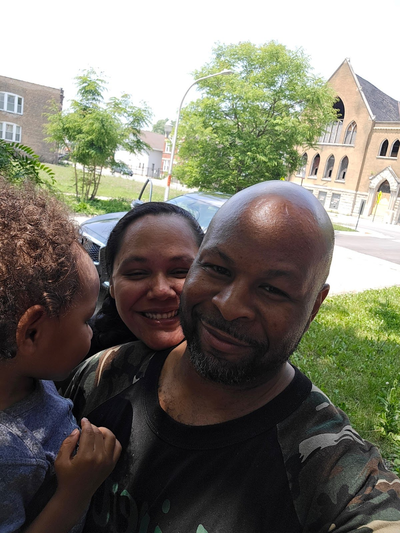For Jermaine Williams, homeownership wasn’t just a milestone – it was a transformative step toward healing generational wounds and building a foundation for the future.
In December, Williams and his wife closed on their first home through Washington’s Covenant Homeownership Program, an initiative designed to address historical housing discrimination by expanding access to homeownership for communities harmed by racially restrictive covenants. For the Williams family, the program offered more than a mortgage – it offered a path to stability.
“To me, generational wealth is essential for peace of mind and well-being. Between the ages of two and twelve, I lived in ten different places. That instability shaped everything. My mom never had a car or a driver’s license, which meant we were limited in countless ways,” said Williams. He shares that he knows what it means to be uprooted, to lose friends, and to never feel settled.
The couple learned about the program through their community network and began their application process in late September. Just a few months later, on Dec. 11, they closed on their new home. Williams credits the Covenant Homeownership Program with giving his family something that generations before them didn’t have access to.
But it isn’t just about owning property; it’s about giving their son something they never had – a stable home and a sense of belonging. Housing instability had an adverse impact on them both growing up, affecting their mental health and behaviors into adulthood. Now, with their son not yet two years old, they are already breaking generational cycles.
“If all you’ve ever known is survival, trauma, and instability, that’s what you pass down,” he said. “We want something different for our children.” That, he says, is probably one of the greatest things they have gained from this program.
Williams is passionate about helping others understand that money is important, but many other factors contribute to a good quality of life.
“Wealth isn’t just money. It’s health, it’s stability, it’s access,” he said. “If all I’ve ever known is survival and trauma, that’s what I’ll pass on. But if I can change that, I can change everything for my son.”
He and his wife have become advocates for the program, encouraging others – particularly in Spokane’s Black and Indigenous communities – to explore the opportunity. However, he acknowledges that skepticism and unfamiliarity often prevent people from applying.
“Most people we talked to thought it was too good to be true, or they were overwhelmed by the process,” Williams noted. “But sometimes people just need to see someone like them do it first before they believe they can too.”
He urges realtors and housing professionals to help spread the word and make the process more accessible to those who have historically been left out.
“I don’t care whether you’re Black, Indigenous, or not–if you’re a realtor in Spokane County and you know about the Covenant Homeownership Program, tell people,” Williams said. “Whether they work with you or not, it’s about community. We need to see more of us in these spaces.”
For Williams, this journey is also a tribute to the late Sandy Williams, founder of The Black Lens and a fierce advocate for economic justice – a leader he continues to look up to. “There’s only one obituary we have in our kitchen – and that’s Sandy’s. I know she would’ve been proud of us for doing this.”
Williams’ story serves as both testimony and invitation: breaking cycles is possible – and it starts with unlearning old patterns, creating new ones, gaining new information, and believing that a different future is within reach.
